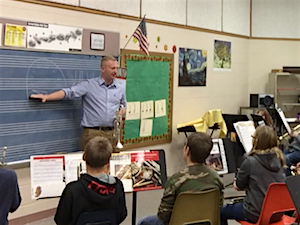Are music teacher job interviews somewhere on your horizon? If so, here are 7 suggestions for what you can do now while you are still in college and have access to great resources.
by Paul Fox
1. Market your pre-K – 12 general proficiencies in music education. Don’t just focus on specific training on your major instrument or voice. Don’t “label” your abilities, put yourself out there as a specialist, or sell yourself short. You should be able to teach general music at any grade level, lead a jazz rehearsal, design a lesson on folk dancing, conduct choir, direct a musical, chart a marching band halftime show, prepare students to take the music theory advanced placement exam, and start a string program.
2. Become a jack-of-all-trades. Imagine that the primary teaching assignment of your first job will be the area(s) in which you now feel weak or unprepared. While you are still in college, use your peers and exchange your expertise to help you bone up on singing, playing the piano, performing on every instrument type you can (woodwind, brass, percussion, strings, folk, and electric). Improvise on any/all instruments and conduct any kind of ensemble you can. Be prepared with strong classroom technology skills as well.
3. Learn how to match your skill set and experiences with the job opening’s needs. Be ready to share anecdotes of your accomplishments and strengths. For example, instead of simply stating “I am a leader” or “I have good classroom management skills,” recall a story about a meaningful moment during your field experiences, counseling at a summer camp, directing a church group, coaching a sports team, volunteering at a childcare center, or completing other positive interactions with young people that support these assertions.
Prepare examples that validate your history of modeling the ideal teaching and professional standards for which most school district administrators are looking: adaptability, communication, content mastery, dependability, discipline, empathy, initiative, innovation, judgment, leadership, philosophy, planning and organization, problem solving, professional development, and teamwork.
4. Enhance your online presence. A digital portfolio and website are indispensable to show off your proficiencies, experiences, and awards. This is where you warehouse your:
- Résumé or curriculum vitae
- Awards
- Transcripts/test records
- Employment history
- Sample programs of recitals and concerts
- References
- Student teaching evaluations
- Congratulatory notes from staff and parents
- Examples of your teaching and your students’ work
- Music education goals, philosophy, classroom management guidelines, assessment rubrics, writing samples
Prepare digital samples (pictures, audio and video recordings) of your teaching experience. Try to show your involvement in a variety of settings, grade levels, and subjects areas (all interactions with music kids) such as: band and string lessons, rehearsals of small ensembles, large group conducting, choral practices, general music classes, dance/drama coaching, marching band events, guitar performances, music technology sessions, jazz improvisation, etc.
Create a business card with an easy-access link (including the password) to your portfolio and website.
5. Set up organizational systems for archiving your successes, managing the employment/interview search/follow-up process, and keeping your professional contacts and notes catalogued and conveniently handy.
- After each interview, debrief yourself – write down everything you think you did “right” or “wrong”. What information/documents do you need to include in future correspondence?
- Make a list of the names/email addresses of the key people on the committee and send them thank you notes.
6. Get together with your classmates for mock interviews. Assess each others’ skills in sharing anecdotes that model core teaching standards (see #3 above). Make video recordings of these simulated “performances” to review. Your colleagues can also help you proofread your résumé, cover letter, and professional website.
7. Build a network of the professionals with whom you connect. Include teachers; guest clinicians; staff and administrators at all field experiences; and other college students – including music education majors at other schools. Join the National Association for Music Educators (NAfME) and your state professional organization, and attend local and state music teacher conferences and workshops.
Paul Fox, BFA, Music/Viola; MFA, Music Education (Carnegie Mellon University) is the State Retired Members’ Coordinator for the Pennsylvania Music Educators Association. As a music educator, he taught orchestra, choral and general music, elementary band, music theory; produced school musicals; and more. Visit his blogpost at paulkfoxusc.wordpress.com.




Leave a Reply